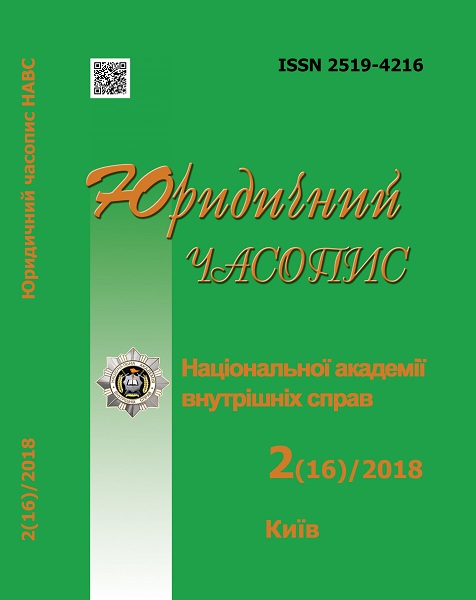Improvement of Criminal Procedure Law of Ukraine about Carrying Out Separate Secret Investigative (Searching) Actions Before Decree of the Investigating Judge
Keywords:
secret investigative (searching) actions, execution investigator’s orders, operational units, operational and technical units, early termination, carrying out in urgent actions, private communication
Abstract
In this article author argued need for changes and additions in criminal procedure law, that relate carrying out secret investigative (searching) actions with a purpose of improvement detection, documenting and investigation of crimes. Written improve efficiency of activity of operational units in combating crimes, activates their work, stimulates initiative in the disclosure of crimes. Also proposed changes will allow: fulfill the requirements of Article 2 of the Criminal Procedural Code of Ukraine in providing a quick, complete and impartial investigation of criminal offenses; focus the work of investigators on carrying out more important, complicated and actual procedural actions in criminal proceedings, execution of which requires his personal participation; manage the members of the investigative group at the appropriate level and determine the direction of pre-trial investigation; achieve qualitative and timely conducting investigative (searching) and secret investigative (searching) actions due to the unloading of investigators from work, that not related with its carrying out.With the implementation of these proposals about improvement legal and regulatory framework of criminal procedure law will take place perception of European and international experience and significantly increase efficiency
pre-trial investigation.
Downloads
Download data is not yet available.
Abstract views: 134 PDF Downloads: 150
How to Cite
[1]
KuznіetsovM. 1. Improvement of Criminal Procedure Law of Ukraine about Carrying Out Separate Secret Investigative (Searching) Actions Before Decree of the Investigating Judge. Law Magazine of the National Academy of Internal Affairs. 16, 2 (1), 186-197.
Issue
Section
Legal regulation of law enforcement
Copyright (c) 2019 Law Magazine of the National Academy of Internal Affairs

This work is licensed under a Creative Commons Attribution-NonCommercial-NoDerivatives 4.0 International License.
- Authors reserve the right to authorship of their own work and transfer to the magazine the right of the first publication of this work under the terms of the Creative Commons Attribution License, which allows other persons to freely distribute published work with mandatory reference to authors of the original work and the first publication of an article in this magazine.
- Authors have the right to enter into separate additional agreements on non-exclusive dissemination of the work in the form in which it was published in the journal (for example, to post an article in the institution's repository or to publish as part of a monograph), provided that the link to the first publication of the work in this journal is maintained.
- The journal's policy allows and encourages the posting of articles by authors on the Internet (for example, in electronic storehouses of institutions or on personal websites), both before the submission of this manuscript to the editorial office and during its editorial processing, as this contributes to the creation of a productive scientific discussion and positively affects the efficiency and dynamics of citing the published work.




